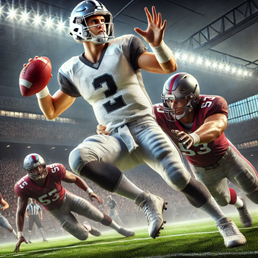
Summary
In our paper, published in Journal of Management Studies, we show that quarterbacks make tradeoffs between multiple goals that are intelligent and effective for winning the game. This contrasts with much of the research in business firms, which suggests that managers can only focus on one goal at a time. Does this imply that quarterbacks and their offensive coordinators are better equipped to manage trade-offs among goals than managers and executives running firms?
What does it mean to be smart when making decisions?
We usually take that to mean that there is a situation with some goals to fulfill and some constraints and risks to consider, and the decision is one that weighs these factors to give a good chance of fulfilling the main goal and preferably also other goals. Football is a good example. The goal is to win, a sub-goal that helps the goal of winning is to advance the ball by running and passing, and the risks and constraints are that the opposing team can stop runs, prevent pass completion or intercept the pass, sack the quarterback, and so on.
These risks and the associated rewards are why we enjoy watching football, in addition to the spectacular athletic performances we see on the offence and defense. We also recognize that football can be a model of life. Maybe there isn’t an opposing team, but there are certainly goals and risks. Indeed, business has the same match of goals, sub-goals, actions that can help accomplish the goals, and risks associated with each action.
Research on business firms has produced a depressing conclusion when it comes to managers and executives pursuing firm goals. It is not unusual to see them pursue one goal to the exclusion of other goals, including sub-goals that would help the main goal be accomplished. That strikes researchers as being slightly less smart behavior than we would like to see.
What about football?
This is where the contrast gets even bigger. We know that football teams are a bit like organizational teams. The offensive coordinator calls the play, but the quarterback can modify the play either before or after receiving the ball when observing the defensive formation or the offensive and defensive movement. The sub-goal of advancing the ball to get a first down is prominent, but it is scoring that matters. Can they do smart tradeoffs between these goals? Absolutely. Our analysis demonstrates that they make tradeoffs that are intelligent and effective for winning the game.
Why, then, do sports teams seem to be smarter than firms?
Maybe it is because they practice their plays a lot and repeat them over and over again, so they actually have more learning and more experience embedded. But there is also another explanation. It is hard for researchers to observe exactly how goals are ranked into main goals and sub-goals in firms, and it is especially difficult to find goals that have a sequence as natural as we see in football. First downs come before scoring, scoring comes before winning. Firms are more interdependent. So, maybe executives are equally smart and we just have not discovered it yet.
For firms, a clear structure of primary goals and sub-goals is essential for decision-making when facing adversity. It is essential that sub-goals have short deadlines, because short deadlines focus attention on sub-goals and help innovation and change. When profitability is disappointing, executives can examine which sub-goals fall short and appear fixable, and they can devote resources to finding solutions and implementing them. Naturally this involves risk, just as running in football does. More importantly, rapid action requires the sense of urgency that deadlines produce.

0 Comments